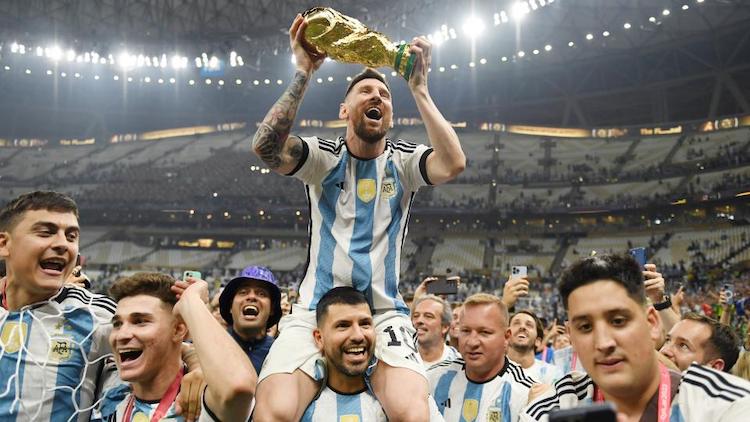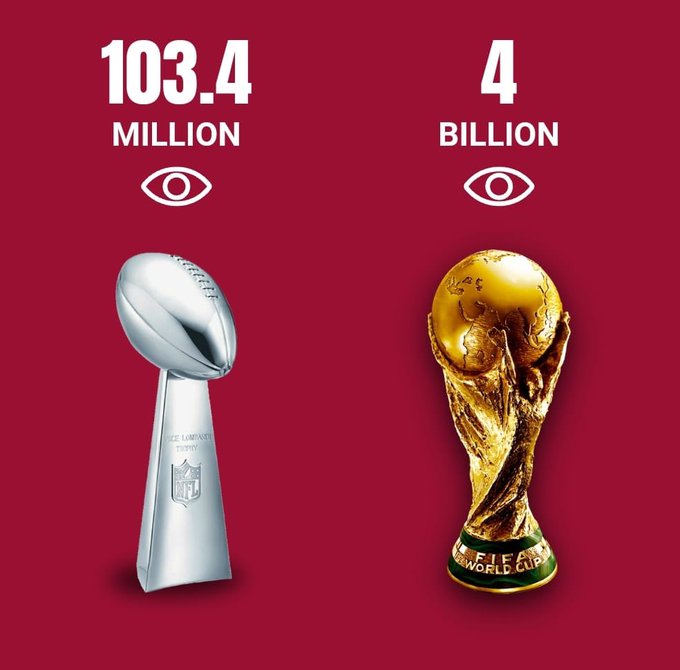I’m pretty tired today. That’s what I get for interrupting a full-night’s sleep for something so trivial as a soccer match.
Oh, but for those who enjoy the game, it was anything but trivial.
World Cup matches in Korea have been playing anywhere from 10PM to 4AM. This meant I could generally watch the 10PM or 4AM matches and still get by. But these last two have been at midnight. So when I woke up a little past 12 on Sunday morning, I decided Morocco and Croatia weren’t worth the loss of sleep. But for the final, I set my alarm and got a couple of hours’ sleep.
I didn’t particularly care who won, but I did favor France a bit. I’m quite cynical when it comes to “stories” of any kind, and this “Messi deserves to get a World Cup” stuff makes me want to hate Argentina. Stop telling me what I’ve got to favor. I prefer just to watch the match and enjoy it. I mean, there have been incredible athletes world-wide who have never won the trophy of whatever pinnacle in their sports. Why should I care that this one guy gets to win one?

I must admit, of course, that Messi is one of the greats. The GOAT? I doubt it. But then again what do I know? The match came down to penalty kicks, and Argentina won because their keeper guessed right. That, and the French failed twice out of four tries. A lot goes into it, but it’s certainly not the optimal way to decide a match. In any case, though, I suppose it has to be done, although I think I’d much prefer a golden goal — that is, basically, “sudden death.” Next goal wins. Let them continue until someone finally scores. Nothing wrong with that. At least there’s a better chance of skill deciding the outcome than chance in the form of a bad kick, a lucky block, or whatever.
Still, I can’t take anything away from either team’s performance today. For a while, France had me thinking “I woke up at midnight for this?” They were awful, and Argentina were all over the place. But then, we get Mbappé scoring a penalty kick for France in the 80th minute, followed by a beautiful volley into the net less than two minutes later, plus a hat trick goal in the extra periods to tie it at 3. Sure, we could’ve gone without the first 79 minutes or so, but from 80 on, it was one of the greatest matches ever. By the end, I really didn’t mind that Messi was getting his trophy — he certainly deserved it.
And now we have 2026 already on the horizon. US, Canada, Mexico. I know it’s probably too late to hope for the next impact US player to step up and finally make the team a contender — we have some great young players, but no one like Mbappé, who’s only 23 right now. Yet, here in 2022, the old guard who have dominated for what seems so long, is moving on. Ronaldo with Portugal; Neymar from Brazil (he’s got one more in him); and, of course, Messi. We’ve got work to do. I look forward to it, and I hope this year’s final has excited enough Americans just a bit closer to taking it seriously enough to win it all someday. If only I can last that long…


Haha I love the photo you chose comparing fan numbers.
This whole Messi winning a cup or Brady winning another Super Bowl or whatever is some of the biggest BS in sports. These are team sport, and while a star player is important, it’s the other players on the field who actually determine whether that star wins anything. Put Messi on the Wales team and he doesn’t make it to the elimination round. Put Brady on the Lions and maybe he gets lucky enough to be on a team that gets eliminated in the Wild Card round. Neither Brady nor Messi won a damn thing except as one player on the team that won.
If you want to know what is wrong with sports these days, you need go no further than how team sports are viewed. We give individuals credit for team accomplishments. It becomes all about the individual. The funny part is Tom Brady and Lionel Messi know it’s not true, but try as they might to give credit to their teammates in interviews, nobody really listens.
Which brings me to the American illness when it comes to sports: an obsession with crowning an ultimate champion. I read an opinion piece about the death of the Rose Bowl. The author stated that this beautiful tradition, the Rose Bowl, was killed by greed and a winner take all attitude. The term I prefer is zero sum game. Now its not that there haven’t always been championships in team sports, but when you go back to the early days, the champion was just the team that did the best during the regular season. An an ultimate champion of everything determined through a flawed playoff system wasn’t that important. The Packers won 3 in a row before there was even such a thing as a championship game, just by having the best record. Before the rival American League started, baseball’s champion was the team with the best record. The World Series only came about to resolve the 2 league problem. And in college football, of course, you just had polls determining the National Champion. The conference champions and Bowl games were actually more important. (The conference champions were simply the teams with the best record over the course of a season.)
The thing is, why do you need to crown this ultimate champion through a playoff system that ultimately doesn’t really tell you who the true best team is? When I was in high school, we played for the conference championship, which again, was the team that had the best record. That was it for football. (Basketball was a state-wide tourney, but the conference championship meant something in that sport too.) Now you have to have a state champion determined through a playoff.
It goes to the heart of sports. We’ve elevated the need for an ultimate champion over the decades, but is that really their purpose? To promote this zero sum game of winners and losers? And what is driving it? (I find it interesting that in the United States have we become so obsessed with declaring a winner, we no longer allow for ties in our sports. Why can’t two teams come off the field knowing they weren’t any better than the other team? Instead we use this artificial means that often deviates from the actual format of the game simply because we insist on declaring a winner.) Our attitude towards sports have become corrupt and perverted by an obsession with winner take all.
What was the genesis of athletic competition? There have always been winners and losers, but was that the purpose of the competitions in the first place – to determine who the winners and losers were? The modern line is “to build character”, but how much character building is going on in today’s climate where it’s win at all cost when even at the grade school level you have parents and coaches screaming from the sidelines at both kids and officials. But was character building even the original intention of sports? Though sportsmanship is important, it’s also just good manners, which is taught at home, not on a playing field. A decent person would display character in any life situation. That it extends to the playing field does not make it a product of the sport. (Teaching a person how to accept loss is BS too. That is something that you don’t need a playing field to learn.) Allusions to character building help rationalize the elevation of sport in society, but I doubt the first people who kicked, threw, or batted a ball even considered it an important product of the game. For some cultures, a sport may have been used to imitate skills needed for life, but ultimately they were a pastime. Winning and losing were not what was important. Participating was. (An obsession with winning actually helps to create cheats and scoundrels.)
Now Vince Lombardi said, “Winning isn’t everything, it’s the only thing.” Decent quote…if your job is to play a professional sport for a living, but when a quote like that permeates all aspects of society, it’s disastrous. It turns everything into a competition, squeezing out the balance between competition and cooperation that is necessary for a healthy society. I’m kind of rambling now, but my point is our obsession with declaring an ultimate winner is unhealthy. So is giving too much credit to one player on a team. Of course, ultimately it’s the way of the world in which we live right now, but these things ebb and flow. Excess usually brings about it’s own demise. (Like in Christopher Nolan’s movie, Interstellar, where professional baseball still exists, but on a sandlot.) There are more important issues confronting the future of our grandchildren, like global warming, that have to be dealt with. (Yet there is a real link between these things – zero sum game attitudes, greed, obsession with individualism, etc. are all attributes that can be linked to not only to sports, but global warming, income inequality, radical nationalism, etc.)